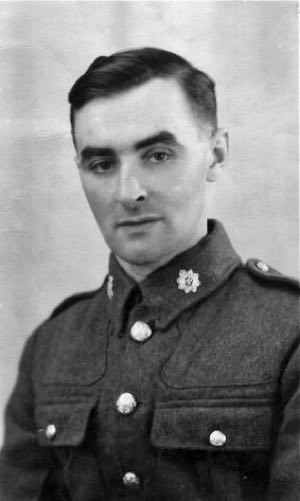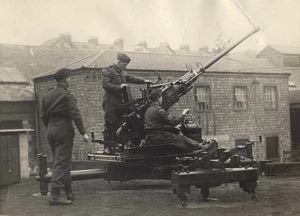
Exeter Stories
Exeter folk and friends in their own words - 1890's to the 1990's │ << Previous story │ Next story >> │
Wartime Memories of Alphington by Edward Gigg
I was only 12 months old when the war started. Consequently, as my Dad had volunteered, I had no memory of him for the first few years of my life. He was captured in 1940, spending most of the war as a Prisoner of War. On his arrival in France, prior to being captured, he was befriended by a French Family. Their descendants and I are still in touch to this day, and we have visited on a couple of occasions. He returned home in 1946. Meeting him on St David’s Station in about May of that year was, as far as I was concerned, the first time I had ever seen him. To me, he had been a photograph on the mantelpiece, to which I said ‘Goodnight’ every night. I was the only child in our road – Shillingford Rd – that didn’t have a Dad at home and I could never understand why it was just me. In later years I fathomed the need for reserved occupations etc. but at the same time I became just a little resentful in one or two cases and remember thinking ‘How does that work then’? That is water under the bridge, as they say. As a general rule, I suppose it is fair to say that I, and others of my age, didn’t really appreciate the seriousness of the situation. We had never known a different way of life, so that was the way it was and we just accepted it. I still get a bit cross when I see people throwing away food, particularly when they have taken too much in the first place.
Times for us, and others I am sure, were hard. I particularly remember wearing my cousins cast off shoes – she was a girl! I don’t ever remember being really hungry, but I suspect my Mum was on some occasions. I do remember asking for more sometimes and being told there wasn’t anything else. Also, if I didn’t eat what I was given, it was served up again at the next meal.
Bombing
The nights of the Blitz have given rise to some of my most vivid memories. We had a Morrison Shelter in the dining room which doubled as a dining room table. Most of our road had Anderson Shelters, but as my Grandma, who also lived with us, was partially disabled, she would not have made it to the bottom of the garden in a hurry, so I think that is why we had a Morrison Shelter. I have no difficulty in recollecting being pulled out of bed when the siren went off and bundled downstairs to squeeze in with my Mum and Grandma. There was the sound of gunfire from an ack-ack gun which was sited somewhere on the Dawlish Rd, the sound of aeroplanes flying over and being told not to worry as ‘It is one of ours’, and general thuds in the distance, presumably from bombs. I can see my Grandma sat with a tot of watered down brandy and her fingers in her ears.
After the all-clear sounded, it was back to bed, but not before looking out of the front bedroom window which had, and presumably still has, a commanding view of Exeter. This is a picture that is still very clear in my mind. It was a mass of red flames and smoke as the City burned. We had relatives living in St Thomas, so the next morning, as we had no telephone, someone made the journey into the City to make sure they were still with us.
My mother had to take her turn as a firewatcher. Every so often, Miss Veitch, who I suppose was the co-ordinator, would arrive with a black tin hat and a whistle. The idea was that the firewatcher would spot a fire during a raid and then blow the whistle to alert somebody. Who that was I am not sure. I used to play with the hat but I wasn’t allowed to blow the Whistle. At the same time I was encouraged to play with my Gas Mask, but I didn’t spend much time with that as it was most uncomfortable, smelled of rubber and made it very difficult to breath. Whilst I don’t actually remember this, the story in the family tells of the night that my mother was on duty and watching from the back bedroom window as the searchlight at Waybrook was picking up an enemy aircraft which was being attacked by ‘one of ours’. What she missed was the fact that an incendiary bomb had dropped out the front and set fire to a hayrick in the field behind the houses opposite. That would be in Smithfield Rd now. Luckily a couple of the neighbours (Mr. Grimes and Mr. Creighton) had seen it and made every effort to put it out.
Incendiary bombs
Most of the bombs that fell in our immediate vicinity were Incendiary Bombs. One landed on the roof of the house next door, (we were semi-detached) and went through to land on the bed. It was quickly covered in sand, which was the prescribed way of dealing with them. Another landed in the centre of our back lawn and for years after, the grass did not grow there. Compared to some, we were lucky. The other legacy of this was the fact that the bombs left empty metal frameworks and I can still see them, in groups of two or three, tied together and hung up to rattle in the wind and be used as bird-scarers for the fruit bushes etc in the garden opposite.
As I lived over a certain distance from the school, I was allocated a family, to which I had to go in the event of a daytime raid. It was one of the cottages just above Oakes grocers shop, and I think was Mrs. Marks. It only happened once. I remember running up the road all on my own, feeling quite scared and worried because I had never been to this house before. The only person in sight was the Headmaster, Mr Rickard, who was stood by the horse trough with his tin hat on. I was convinced that a bomb was going to fall on my head before I got to the cottage. No sooner had I got there, the All-clear sounded so I carried on up the road and went home, only to be sent right back to school again. One day, while sat in class someone came in with Miss Richards, our teacher. I was singled out and given a wooden toy boat. This was because I hadn’t got a Dad at home. I expect there were others in the school also given them. I am not sure where it came from, obviously a sort of charitable thing. I was some pleased with this and when I got home that evening took it with me into the bath. It promptly turned upside down and I was devastated. I never tried it again.
Many will remember that there was a Prisoner of War camp on Haldon. Some of the prisoners seemed to be able to roam around sometimes and I would see them walking down Shillingford Rd. I think we viewed them as some sort of Aliens and watched from the comparative shelter of our front hedge as they passed by. On being told that they were Prisoners of War, I remember once asking if my Daddy was there as well!
The decoy
Hopefully others will recollect something about my next memory and maybe add to it. Located in a field on the left hand side of Markham’s Lane, just a little way past and opposite where Markham’s Farm is now – it wasn’t there in those days – they built a series of black structures which were arranged in circles. It was known as The Decoy and I have always understood that the idea was to show a light during a bombing raid in the hope of enticing the bombers away from the city. I am not sure it ever worked as I don’t think there were any bombs dropped on or near it. That is probably just as well as I recall being told that folks from Exeter would leave the city at night, trek to Alphington and spend the nights in the adjacent fields, in what they considered comparative safety. Maybe it wasn’t as safe as they thought! When these boxes were removed after the war, the traces of circles in the grass were quite obvious for a few years.
Many houses had their metal railings removed as a contribution to the war effort. We didn’t have any of those, but a lady came one day, empowered to look through the kitchen cupboards and deprived us of what she considered to be an excess of Aluminium saucepans. I don‘t think my mother was too impressed.
Pet rations
Our house, like many others, had a pet rabbit. The idea, unbeknown to me, was to fatten it up to supplement the meat ration. One morning I was told that it had died, which of course upset me. I am still not sure whether I actually ate any of it. I have a suspicion that my Mum would have given it to someone else to deal with.
This epistle has turned out to be a bit longer than I intended. So, my apologies if you have had a struggle to make it this far. If you haven’t got this far then it won’t matter will it?
I am aware that there were many who suffered much more than we did. There is no doubt that the events of my early years had a profound influence in the shaping of my life. Of course it would have been better if it hadn’t happened, but I wonder how different I would be?
Edward Gigg. 23.01.2017
 Edward's father Elias Thomas James (Tom) Gigg was held as a POW from 1940.
Edward's father Elias Thomas James (Tom) Gigg was held as a POW from 1940.
 A bofors (ack-ack) gun near Central Station.
A bofors (ack-ack) gun near Central Station.
│ Top of Page │